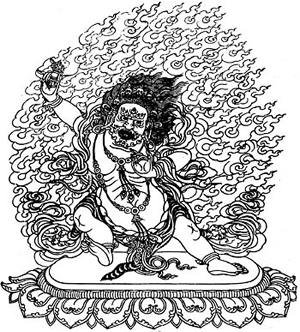Did Vajrapāṇi pass gas?
The short answer is: he did not. So why do we think he did?
Let us look at the incriminating passage in the Derge Kanjur (vol. Dza, 238a3-7, but I quote only the end):
A 'b' seems to make quite a lot of difference here. The reading is shangs, which of course means nostril, as opposed to bshangs, excrement. This is a small emendation then, but the note to the sentence (ibid. p. 416) does not tell us so (incidentally, the note again has Bhūtaḍamara).
Let us look at the Sanskrit then, before accusing Vajrapāṇi of uncouth behaviour:
We could of course argue what emendations to propose. These are ad hoc, I have not studied the grammatical peculiarities of the Bhūtaḍāmara. The important bit is 'nāsikāt' and 'nāsikātaḥ', which both mean 'from the nostril'. Emitting 'wind' from the nostril to revive the dead is well-attested elsewhere (e.g. the Catuṣpīṭha 1.2.), but we do not have to go into that here. Vajrapāṇi can therefore be exonerated.
Yes, those are flames. Image borrowed from here.
"Even more dramatic is the Bhūtaḍamara [sic!], which begins with the sly Śiva requesting that Vajrapāṇi kill all the evil ones in the world, a category that normally includes Śiva himself. However, Vajrapāṇi agrees that this is a good idea and instantly slaughters all the other gods (Indra, Brahmā, Viṣṇu, and other available deities), whom he immediately revives with an enormous passing of gas from his anus, a hilarious transformation of the gods into an object of farce." [Ronald Davidson, Indian Esoteric Buddhism, p. 333]
Let us look at the incriminating passage in the Derge Kanjur (vol. Dza, 238a3-7, but I quote only the end):
de nas gsungs pa tsam gyis dpal Rdo rje 'chang gi shangs kyi bu ga nas rlung chen po ro 'tsho bar byed pa byung bar gyur te | [...]
A 'b' seems to make quite a lot of difference here. The reading is shangs, which of course means nostril, as opposed to bshangs, excrement. This is a small emendation then, but the note to the sentence (ibid. p. 416) does not tell us so (incidentally, the note again has Bhūtaḍamara).
Let us look at the Sanskrit then, before accusing Vajrapāṇi of uncouth behaviour:
athāsmin bhāṣita{|}mātre śrīvajradhara [=dharo] nāsikāt {||} mahāpavana[ṃ] mṛtasaṃji[¯]vani[ṃ] nisṛ[jati] sma || (Kaiser Library 244 = NGMPP C 27/3, 2r)
athāsmin bhāṣitamātre śrīvajradharanāsikātaḥ mahāpavana [=pavano] mṛtasaṃjīvanī niścarati | (Göttingen Xc 14/50 [1], 1v)
We could of course argue what emendations to propose. These are ad hoc, I have not studied the grammatical peculiarities of the Bhūtaḍāmara. The important bit is 'nāsikāt' and 'nāsikātaḥ', which both mean 'from the nostril'. Emitting 'wind' from the nostril to revive the dead is well-attested elsewhere (e.g. the Catuṣpīṭha 1.2.), but we do not have to go into that here. Vajrapāṇi can therefore be exonerated.
Yes, those are flames. Image borrowed from here.
Labels: Bhūtaḍāmara, Sanskrit, tantric studies





7 Comments:
Classy stuff, Peter. Like everything else you've been posting lately.
Can you tell me how on earth I missed the reincarnation of Jinajik by usque 2 years???
Am I understanding correctly that shangs is your emendation in place of the printed bshangs? Completely convincing (I am just sorry for R.D.).
No, it's R.D.'s silent emendation (if the was reading the Derge Canon, which - as I quoted here - has shangs).
That's peculiar. He emended a plausible text, which is also supported by the Sanskrit and by a well-known topos…
Peculiar was exactly the word I was looking for. Would be interesting to see whether this passage in IEB is quoted in secondary literature.
Ha ha ha, it would be fun. Typing the relevant passage on google has, fortunately, yield no result.
Post a Comment
<< Home